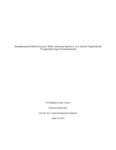Strengthening the Detroit Economy While Addressing Injustice in Low-Income Neighborhoods Through High-Impact Entrepreneurship

View/
Author
Taylor, O'Callahan Rebecca
Subject
Washington and Lee University, Shepherd Poverty Program
Economic development projects
Michigan -- Detroit
Social justice
Tax incentives
Urban poor -- Employment
Metadata
Show full item recordDescription
O'Callahan Rebecca Taylor is a member of the Class of 2017 of Washington and Lee University. Capstone; [FULL-TEXT FREELY AVAILABLE ONLINE] All stakeholders in Detroit have a collective responsibility to reduce injustice in low-income neighborhoods. However, this paper uses a social responsibility framework to argue for the responsibility of high-impact firms to reduce injustice in Detroit—in addition to proposing a method to require the fulfillment of this responsibility. Successful high-impact firms benefit the economy by adding jobs and wealth, and the generous tax incentives that they receive should theoretically widen their profit margin. The main goal of these tax incentives is to accelerate economic development—and yet the development is not occurring in the poorer neighborhoods. These firms reaping the tax benefits are connected to the social-structural processes that inflict injustice upon the poor, and they should seek to mitigate this injustice. The Detroit City Council (DCC) and Michigan state government should continue to incentivize high-impact firms to invest in Detroit's economy, even if the Greater Downtown area receives the main benefits. To address social injustice in low income populations, Detroit should require firms, as a condition of receiving business incentives, to create and report on anti-poverty initiatives outside of the Greater Downtown. [From Introduction] O'Callahan (Callie) Taylor